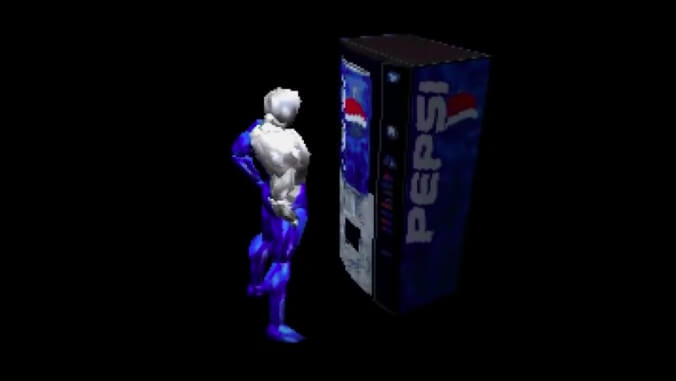Before in-game ads, these video games were ads

This week’s entry: Advergames
What it’s about: Commercials you can play! Since the advent of video games, companies have skipped right past product placement and instead put out games whose sole aim was to push sugar water, breakfast cereal, and even dog food on the impressionable gaming public.
Biggest controversy: Wikipedia cites “ethical and legal concerns around advergames,” starting with the fact that they’re aimed at children young enough to not know they’re being pitched to. There was widespread concern that games pushing junk food were contributing to the obesity epidemic, though those pushing healthy food could also positively influence kids.
There is also truth-in-advertising issues—Gatorade was fined $300,000 for the free mobile game Bolt!, in which Usain Bolt advises players to “keep your performance high by avoiding water,” implying that only Gatorade has what plants (and gamers) crave. Wikipedia asserts that “Gatorade had been shown to be more harmful to the human body than water,” weirdly implying that water is also harmful, just less so.
Strangest fact: There’s apparently a Pepsi-themed superhero who had his own video game. Pepsiman appeared in several commercials in Japan in the mid-’90s, before making the leap to PlayStation, with the Japan-only Pepsiman game. Pepsiman travels to real-life locations San Francisco, New York, Texas, and Pepsi City, saving dehydrated people by giving them Pepsi and occasionally riding a skateboard. In between levels, players are rewarded by a video of a man drinking Pepsi, “as they were cheap to produce.” Complex deemed it “not a bad game,” as long as the player has a high tolerance for Pepsi branding.
Thing we were happiest to learn: The first advergame is still one of the best. When arcade games were first gaining popularity, Budweiser released the relatively subtle advergame Tapper in 1983, in which you play a bartender who slings pitchers of Bud to increasingly demanding customers. The game was popular enough (and worked independently enough of its advertising message) that it was rebranded Root Beer Tapper for the younger-skewing video arcade market.
The only other advergame in Tapper’s league is Chex Quest, which Wikipedia praises as “one of the few advergames that was enjoyable to play.” Although the reason is obvious, Chex Quest is simply the already-popular game DOOM, re-skinned with a hero who shoots cereal at cartoonier (and less gory) enemies.
While there’s no indication as to whether Sneak King is any good, the Burger King-themed Xbox 360 game sold between 2.7 and 3.2 million copies in 2006. (The game was “available through meal purchase” alongside similarly burger-themed PocketBike Racer and Big Bumpin’, so it’s not clear whether the game was sold or given away.)
Thing we were unhappiest to learn: Advergames are one of the only things Wikipedia doesn’t have a comprehensive list of. The games mentioned in this article are among the only ones mentioned in the Wiki article, which means readers can’t easily discover the joys of Atari 2600 greats like Kool-Aid Man and Chase The Chuck Wagon (based on the dog food commercial); NES’ 7-Up-themed Cool Spot; or more modern games like Doritos VR Battle or Dikembe Mutombo’s 4 1/2 Weeks To Save The World, a surreal 2012 game in which the former NBA All-Star and his friend Science The Bear have to extend the Mayan Calendar to stop the world from ending, which was somehow also an extended commercial for Old Spice. Sometimes the world is a place of astonishing beauty.
Also noteworthy: Sometimes these games backfire. In 2004, Intel released the thrill-a-minute Intel IT Manager Game, which let you simulate running an I.T. department, complete with hiring. But in a feature that was both horribly sexist and depressingly accurate, the game only allowed you to hire male candidates. After the expected backlash, the game was taken off the market and redesigned. And we can’t prove that 2002 military recruitment game America’s Army is responsible for the disastrous aftermath of the Iraq War and the rise of ISIS, but we can’t completely discount it either.
Best link to elsewhere on Wikipedia: Tapper was the first advergame, but it wasn’t the first attempt. In 1978, Ralph Lauren commissioned an Atari game about polo (the sport) to promote Polo (the cologne), but it never made it to market. It was created by Carol Shaw, who was both one of the first female game designers and computer programmers. She was hired by Atari straight out of her master’s program as a software engineer, moving on from Polo to create early Atari 2600 standards 3D Tic-Tac-Toe and Video Checkers, and to co-create Othello and Super Breakout. After leaving Atari for a stint as an assembly language programmer, she rejoined the gaming world, creating River Raid, a huge hit for Activision, following it up with Happy Trails for Intellivision. She was able to retire in 1990 at age 35, largely on the money she earned from River Raid.
Further down the Wormhole: Shaw’s Super Breakout was an update of 1976’s Breakout, one of the earliest and simplest home-console video games. We usually jump a few pages ahead, but the story of how a simple block-breaking game changed the course of human history was too good to pass up. We’ll take a look at the Atari 2600’s most inadvertently influential game next week.